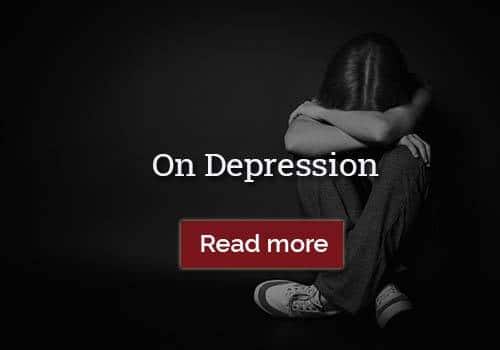To think of it actress Deepika Padukone was the first one in Bollywood to talk about depression in 2015. Then stars like Karan Johar, late Rishi Kapoor talked about depression in their autobiographies. Later Anushka Sharma, Varun Dhawan, Ileana D’Cruz also spoke about their fight with depression. Depression is a reality in modern life irrespective of the fact if one is in the competitive world of showbiz or is a homemaker with a relatively staid life of managing kids and kitchen. As suicide prevention counselor Nishmin Marshall points out, “Today, people see life mostly in material terms. The mad race of who has more than the other. The craze of social media and how many likes and views we are getting in the first three hours (all of us are party to that) of posting something is stressful. What are we trying to prove and to whom? Is it insecurity, lack of faith in oneself, the outside world and many a times our own families who pressurize us unknowingly questioning us how much we have achieved.” We asked a panel of psychologists and psychiatrists two vital questions.
1. Why people don’t reach out for help when depressed?
2. What are the practical steps they can take to deal with depression?
They tell you how to understand the signs of depression and the steps you need to take to deal with depression. Their answers help you to be aware and understand mental health better.
Nishmin Marshall, Suicide prevention counselor
There are so many children, teenagers, adults, and of course the elderly who are going through feelings of dejection, anger, pain, frustration, confusion, and the list goes on… If so many people are feeling this miserable, what is stopping them from asking for help? Why do people hesitate to ask for help when they are going through this phase of life? First, there are people who don’t want to accept that they have a problem. There is a stigma attached to asking for help. “What will others think?” is always on their mind. If family members know that someone is struggling with mental illness, many of them pass it off saying, “Don’t worry about it, this is a passing phase.” You can be good looking but feel ugly in the mirror. Everyone is fighting a battle and you know nothing about it… Reach out to ask for help.
What you should do…
At such times talk to someone you trust. Being listened to helps. Reach out to family, friends, counselors, helplines. There is a lot of help available. When one communicates their anxiety to a counselor, they are guided by showing them coping skills which would help them deal with the situation. Talking helps even if it is to a stranger, as you have nothing to hide from them, at times writing down your feelings also helps. You get it off your chest and feel much lighter. Life is precious….treasure it.
Deepak Kashyap, Counselling therapist
We have a deep seated view, which can be sometimes even true. We feel we won’t be understood and even if friends and family do understand they do not know how to help.
What you should do…
Even though it is tremendously difficult, but physically push yourself to go out of the house, meet people and workout. Eat potassium rich fruits like bananas and make sure your vitamin levels are optimal. And if you have a condition of substance use with an ongoing diagnosis of depression, then you are at a higher risk of feeling the effects.
Chavi Bhargava Sharma, Psychotherapist
People hesitate to ask for help because they are in severe depression where the sense of hopelessness and helplessness along with lack of strength and motivation make them not seek help. Also there is guilt, shame about decisions or events in their life.
Mallika Pathak, Psychologist
Because we’re too afraid of being judged as weak or as seeking attention, that’s why we do not ask for help. There is toxic positivity around us and every time we try to reach out for help, there’s always “someone who has it worse” than us. We’re constantly going on minimising our struggles and ignoring our emotions- thinking that if we express them, people around us will think we’re not strong enough to deal with our own lives.
What you should do…
Gopa Khan, Mental health therapist
There are many reasons why we hesitate. One is being in denial and not wanting to accept that one needs help, the other is feeling “embarrassed” or “ashamed” that one is such a strong person and one can’t deal with it alone. That one needs to be “strong” to deal with it. Depression is such a “dark” feeling that one feels there is no end to it. Also the “stigma” of seeking help for mental health is always there. We don’t hesitate telling people about going to a dentist but feel ashamed or even dislike the idea of seeking help from a counselor and psychiatrist.
What you should do…
One practical thing that a depressed person can do is not hide depression from family and friends. Because they are our support system, that will help us get back on our feet. Another thing that will help, reach out immediately to mental health specialists and start counseling and take medication if required. We take Crocin for headache so we take medication for our body and counseling for our negative thinking patterns. There are several helplines, call anonymously if required. Call your family, tell them to assist you, develop a self care plan and most importantly a safety plan so that when you are truly down, you can protect yourself from taking a drastic step. Also be aware depression is completely curable but it takes time and you have to sail through your good days and bad days.
Shabri Prasad, Psychologist*
First of all it’s very hard to open up about your inner demons to someone. Your inner energy when depressed collapses and your circle of thoughts are of doom and inherent melancholy. You just don’t want to move, don’t want to get out of bed and asking for help invokes fear. I talked to a girl yesterday undergoing depression she gets anxious and upset while talking about her feelings to her therapist because she cannot fathom anyone is capable of understanding or healing her. That’s avoiding your feelings to be numb.
What you should do…
One must reach out and know many of us have the patience to consistently listen. Depression signs are visible through physical reaction. Loss of sleep, eating too much or too little, crying, lashing out and a feeling of emptiness are the signs. If one recognizes these signs then one accepts something is wrong. Once the acceptance comes then they seek help. Unfortunately it has to come from within.
*Shabri Prasad studied Psychology at The City University of New York
Riddhi Doshi, Child pyschologist
People do not seek help in the first instance as they fail to understand themselves that they are suffering from early depression or depression. Fear of being judged also bothers us as mental health is still taboo. Advice is given not to cry or become emotional. I wish people would understand how difficult it is for some people even to get out of bed during those days, forget calling anyone. To make things worse, looking at those who claim to have it all, further instills a feeling of inadequacy in them and they bottle up even more for the fear of appearing as damaged goods.
What you should do…
It’s important for an individual to realise the first disconnect within and just take one step forward and talk it out. Why wait for depression to take it over. Be aware of your feelings and emotions. Mental health professionals have their own limitations and it’s not easy for them to just reach out neither it’s easy for normal people to just listen.
Prachi Vaish, Psychologist
People do not seek help for fear of judgment, being invalidated or ridiculed. So for a majority of people mental health is a shameful embarrassing issue. Why do you think people want to be anonymous when they ask for help? No one would request to be anonymous asking for advise for hemorrhoids.
What you should do…
The only thing one needs to prepare to seek help is to realise that they have already tried every trick in their arsenal and nothing has worked, so why not try something new? It can’t get any worse because they are probably already near rock bottom but it CAN definitely get better. If you don’t do anything or seek help the chances of improvement are 0% but if you do, they are definitely better than 0%…so why not take that chance?
Pawan Sony, Psychotherapist
Stigma is definitely the biggest reason for not seeking help. Also, there’s this cultural idea of someone with mental health issues being ‘paagal’ and we all have this image of how someone who is a paagal looks like and behaves, which is usually derived from popular entertainment.
What you should do…
Though depression affects different people differently so it would be difficult to prescribe one thing, but writing a journal about how one is feeling can help. Also breathing exercises help a lot.
Mansi Poddar, Psychotherapist
The main reason is because many don’t even realise it’s depression or that something is wrong. People feel “terrible” but keep trying to overcome it till they give up. You can see that in many people who stop bathing, getting out of bed etc. it’s like the life energy has left them.
What you should do….
The first thing I would recommend is call a well trained therapist. And if people around the person see something seems “off” call a professional. If people don’t want to do that, Google your symptoms and become aware. Awareness is key.
Jayant Sundaresan, Psychologist *
I feel the biggest reason that we hesitate to ask for help is that we do not want to be judged.
What you should do….
And the one practical thing a depressed person can do is to practice a 2 minute Gratitude Ritual. It helps you focus on what you have which is working for you from a negative focus on what you do not have.
*Assistant Professor, Faculty of Behavioral and Social Sciences (FBSS), MRIIRS
Swati Bajpai, Psychotherapist
I am a psychotherapist working in Chicago and I work with individuals struggling with depression, anxiety, grief, trauma and serious mental illness. I would say that It takes courage to seek help and there is a fear of being misunderstood. Someone who is depressed is already feeling hopeless, helpless and isolating themselves. And many a times they feel the symptoms but can’t express themselves. And enough misinformation is there in the form of ‘advice’ to muddle up the brain.
What you should do…
For psychotherapy, the person has to be ready to talk. There should be awareness about what exactly is depression, anxiety etc. There should be screenings at the doctor’s office, schools, colleges etc so that people become self aware and seek help. We all struggle from some sort of depression and anxiety but we work through it. The most important factor is ‘functionality’. If you are finding it difficult to conduct work, relationships, social life, it’s time to seek professional help. Also if they understand what the symptoms are, they can understand that they are suffering from it. So that awareness about symptoms is very important. Most people who think they are depressed also have anxiety. Anxiety is one of the most prevalent aspects of mental health issue. Last is resilience. The ones who seek help and work through the process have resilience.
Valli Kala, Psychological counselor*
I mostly feel that if a person is in depression he/she may not be aware of that. The people around only will notice their changes.
What you should do…
Hence I appeal the family and friends to be (BE) with them. Literally being with that person is the first thing needed. Do not try to advice, chide or force them. JUST BE WITH THEM. That will only slowly impact them to open up and share. Here if the listener assures and builds trust the process gets easier. The person needs to become aware, accept that he is depressed and then decide to take help and move on. Lot of time and patience is needed.
*Counselor – practicing with Transactional Analysis as the base.
For Help Call:





